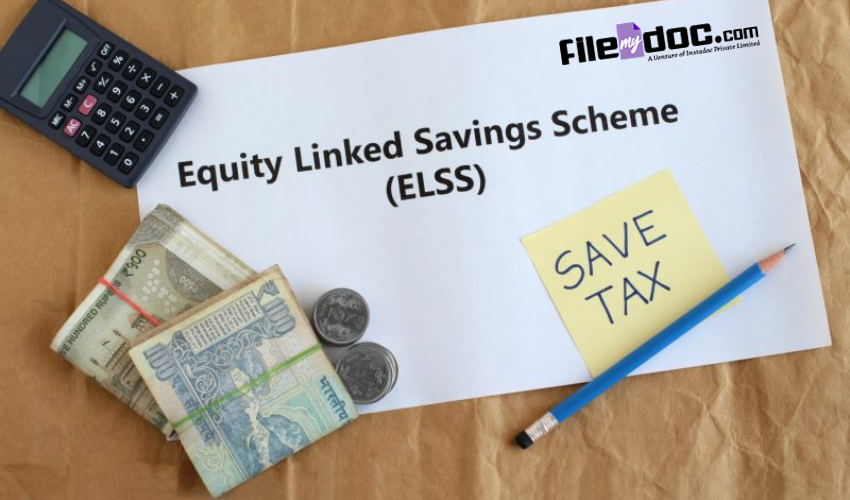Equity-Linked Saving Schemes (ELSS) are considered to be the best tax saving option for several reasons:

- High returns: ELSS has the potential to provide higher returns compared to other tax-saving investments such as Fixed Deposits (FDs) or Public Provident Funds (PPF).
- Tax benefits: ELSS provides tax benefits under Section 80C of the Income Tax Act, up to a maximum of ₹1.5 lakhs per financial year.
- Equity investment: ELSS is a type of mutual fund that invests primarily in equities, which have the potential to provide higher returns over the long term compared to debt investments.
- Short lock-in period: ELSS has a lock-in period of 3 years, which is the shortest among all tax-saving investments.
- Diversification: ELSS provides exposure to a diversified portfolio of equities, reducing the risk of investing in a single stock.
However, it is important to keep in mind that ELSS is a market-linked investment and the returns are not guaranteed. It is important to consider one’s risk tolerance and investment horizon before investing in ELSS.
Types of ELSS
ELSS (Equity-Linked Saving Schemes) are a type of mutual fund that invests primarily in equities. There are several types of ELSS funds, including:
- Large Cap ELSS: These funds invest primarily in large-cap companies, which are well-established and have a strong track record.
- Multi-Cap ELSS: These funds invest in a mix of large-cap, mid-cap, and small-cap companies, providing diversification across market capitalization.
- Mid & Small Cap ELSS: These funds invest primarily in mid and small-cap companies, which have higher growth potential but also higher risk.
- Thematic ELSS: These funds invest in companies that are aligned with a particular theme, such as infrastructure, technology, or healthcare.
- Dividend Yield ELSS: These funds invest in high-dividend-yielding companies with a focus on generating regular income for investors.
It is important to note that the performance of an ELSS fund depends on the investment strategy and the performance of the underlying companies. It is important to do thorough research and consider one’s investment goals and risk tolerance before investing in any type of ELSS fund.
Things to know about ELSS before you invest
Before investing in ELSS (Equity-Linked Saving Schemes), it is important to keep the following things in mind:
- Investment objective: ELSS is a market-linked investment that invests primarily in equities. It is important to understand that the returns are not guaranteed and there is a risk of losing money.
- Risk tolerance: ELSS is considered to be a high-risk investment as it is exposed to the ups and downs of the stock market. It is important to consider one’s risk tolerance before investing in ELSS.
- Investment horizon: ELSS has a lock-in period of 3 years, which means that the invested amount cannot be redeemed before that period. It is important to have a long-term investment horizon when investing in ELSS.
- Diversification: ELSS provides exposure to a diversified portfolio of equities, reducing the risk of investing in a single stock. However, it is important to keep in mind that the portfolio may still be concentrated in certain sectors or companies.
- Fund management: The performance of an ELSS fund depends on the investment strategy and the performance of the underlying companies. It is important to consider the fund management and track record of the fund before investing.
- Tax implications: ELSS provides tax benefits under Section 80C of the Income Tax Act, up to a maximum of ₹1.5 lakhs per financial year. However, capital gains from the sale of ELSS units are taxed, and it is important to consider the tax implications of the investment.
It is advisable to consult a financial advisor and seek professional advice before investing in ELSS.
Frequently Asked Questions
Here are some commonly asked questions about ELSS (Equity-Linked Saving Schemes):
1. What is ELSS?
ELSS is a type of mutual fund that invests primarily in equities. It provides tax benefits under Section 80C of the Income Tax Act and has a lock-in period of 3 years.
2. How does ELSS work?
ELSS works like any other mutual fund. Investors pool their money together and the fund uses the money to buy a diversified portfolio of equities. The returns from the investments are shared among the investors based on the number of units they hold.
3. What are the benefits of investing in ELSS?
ELSS provides tax benefits under Section 80C of the Income Tax Act, has the potential to provide higher returns compared to other tax-saving investments, and provides exposure to a diversified portfolio of equities.
4. What are the risks of investing in ELSS?
ELSS is a market-linked investment and the returns are not guaranteed. There is a risk of losing money, especially during market downturns. Additionally, the portfolio may still be concentrated in certain sectors or companies, which increases the risk of the investment.
5. What is the lock-in period for ELSS?
The lock-in period for ELSS is 3 years, which means that the invested amount cannot be redeemed before that period.
6. What are the tax implications of ELSS?
ELSS provides tax benefits under Section 80C of the Income Tax Act, up to a maximum of ₹1.5 lakhs per financial year. Capital gains from the sale of ELSS units are taxed.
7. How to choose the best ELSS fund?
To choose the best ELSS fund, it is important to consider the fund management, track record, investment strategy, and performance of the underlying companies. It is advisable to consult a financial advisor and seek professional advice before investing in ELSS.













